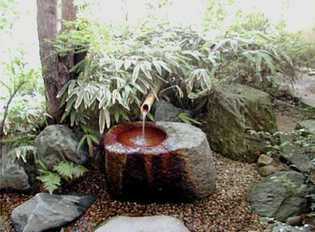わびさび - Wabi and Sabi
The Japanese are clever and intelligent people and their way of thinking is varied and suitable to their culture. In fact, wabi meant, many years ago, to become weak and weary. This meaning came from the word wabu. Wabishi, the adjective, meant, to be lonely and without comfort. In those days, the physical and mental pain of the people was widespread and constant. Every day, people felt lonely and comfortless and could do little to help themselves.
日本人は知性溢れる優れた民族ですから、その考え方はもっと多様でしょうし、日本文化に根ざしたものであるはずです。 わびは「わぶ」という言葉に語源を持ち、つらくて精も根も尽き果てたという意味で使われていました。形容詞の「わびしい」は、孤独で、すがるもののない状態を指しました。当時の人々の生活は孤独感にさいなまれ、助けてくれるものもなく、逃れることのできない精神的、肉体的な苦痛に満ちていたのです。
Then, in the Kamakura Era (1185 – 1333) and in the Muromachi Era (1336 – 1573), literary people tried to change the bad feelings of wabi into good ideas of life. Wabi was developed into the positive thought that poverty, loneliness and the absence of beauty led to freedom from material and emotional worries. This idea became the central concept of the tea ceremony and of certain philosophical works. These new thoughts were especially accepted by tea ceremony masters, such as Murata Shuko (1422 – 1502), Takeno Joo (1504 – 1555) and Sen no Rikyu (1522 – 1591). They pointed out the richness to be found in poverty and the beauty to be found in simple things.
鎌倉時代(1185〜1333)、室町時代(1336〜1568)になると、この「わび」は文学者たちの手により、貧困、孤独、美が欠如した状態を通した物欲や苦悩からの解放という、肯定的な意味合いを持つ語に変わりました。そして、この発想は茶道や、哲学の中核を成す概念となっていきます。村田珠光(1502没)や武野紹鴎(1504〜1555)、千利休(1522〜1591)といった人達は、貧しさの中の豊かさ、質素なものの中に潜む美を発見し、世に紹介しました。
Of course other people are able to understand the same feelings and enjoy them. My own family was very poor and we found that some of the experiences we had, and the foods we ate, were really wonderful. I am sorry other people were prevented by their excess money from having the same kinds of pleasures. Even today, I feel nostalgia for the “Good Old Days.” Let’s keep open minds about such cultural thoughts.Basic ideas may vary a little, from culture to culture, but people are really very much the same all over the world.
これは、日本人のみならず、世界中の人が共有できる感覚です。私はとても貧しい家庭で育ちましたが、家族と過ごした時間、我が家だけの食事は掛け替えのない素晴らしいものでした。物やお金に困らない生活を送り、心を忘れてしまった人を見るととても気の毒です。私は今でもこの「古き良き時代」を懐かしく思い出します。こうした文化的な思想に私たちは常に耳を傾けるべきです。世界中で、文化により考え方は多少異なっても、人間はみんな同じです。
Sabi helps us be observant of the beauty in age. Antiques are beautiful to us, partly because their age gives them a certain patina, or glow, that is missing in new things. Antiques are treasured in all countries of the world. Family relics and household goods stay in families for years and gain respect and value as time goes by. The ideas of the appreciation of the loveliness of age must be universal. In addition, of course, just as we appreciate the beauty of old things, we can also value the beauty of an old person, who has experienced life, with its joys and troubles.
さびの精神」によって、私たちは古いものの持つ美を鑑賞することができます。骨董品は、古さが生み出す新しいものにはない独特の色とつやを持っており、これを美しいと感じるのです。世界中どこでも、各家庭には何年も前の古い物があり、時が経つにつれてその価値は増していきます。古いものを慈しむ心は万国共通なのです。そして、古さが魅力となるのは物だけではありません。酸いも甘いもかみ分けた老人の持つ枯れた美しさもまた魅力的です。
The old Japanese masters created new meanings for painful feelings all people experienced, but found it hard to remedy. These new values added something warm and comforting to the the trials that afflicted all Japanese in the old days. Today, many people have forgotten the old meanings of wabi and sabi. Many people don’t understand the new meanings of these words either. It might be difficult to find synonyms in other languages for wabi and sabi, but the feelings can be described in very lovely terms.
昔の日本の職人は、人々が感じていた、なすすべのないさまざまな苦痛に新たな解釈を与え、それによって庶民は安らぎを得ることができたのです。今日では、わびさびという言葉の元の意味も新たな意味も知らない人が多くいます。外国語にはわびさびに相当する言葉はないかもしれませんが、彼らにも理解することは可能なはずです。
We think of the softness of the skin of old people as a mark of those who have experienced the trials of life. Who made my old netsuke, and how much time did he or she take to carve it? Did the artist love the work? I love it!
老人の肌の柔らかさは、人生の試練をくぐり抜けてきたことを何よりも物語っています。私の持っている根付けは、だれがどれほどの時間を費やして作ったのでしょう。そして自分の作品の出来具合をどう思ったのでしょうか。もちろん私はたいへん気に入っています。
I often used to go into the woods to get away from the modern world and experience peace in the quiet wilderness. I would seek out lonely rocks and rushing mountain streams where the winds that blew recognized no human. In places like these, I knew for certain that I was nothing! At the same time I saw the beauty of nature and of life itself. Wabi and sabi do exist. I have experienced them. They are associated with Buddhist thought, but educated people all over the world understand them, too!
以前、私は日常から離れ自然の静寂の中で心の平穏を取り戻そうと、よく森へ出掛けました。そして、ひっそりと佇む岩や、谷川の急な流れを見つけ、ただ風に吹かれるまま過ごしました。そうした場所にいるとき、私は自分がいかに小さな存在であるかを知り、同時に自然と生命そのものの持つ美を実感することができたのです。「わびさび」は確かに私たちの中に存在しています。これは仏教の教えに基づくものですが、世界のすべての人が理解できるはずです。
